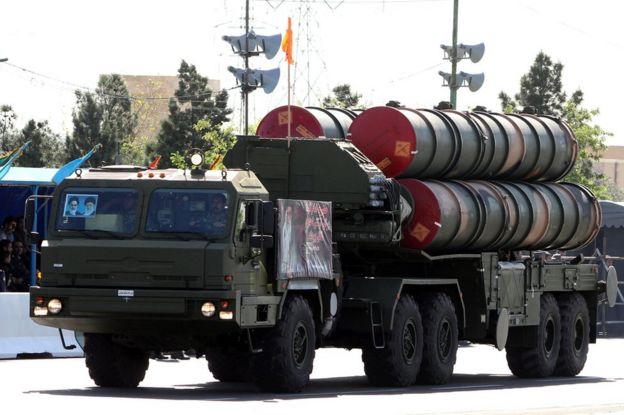US President Donald Trump has told Israel’s Prime Minister, Benjamin Netanyahu, that Iran will never have nuclear weapons.
He suggested the Iranians thought they could “do what they want” since negotiating a nuclear deal with world powers in 2015.
Mr Trump arrived in Israel from Saudi Arabia, where he sought to win Arab states’ support for fighting extremism.
He has called for a peace deal between Israel and the Palestinians.
However, he has been vague about what form it should take, saying he prefers to leave it to both sides to decide between them in direct talks.
The two-day visit to Israel forms part of Mr Trump’s first foreign trip as US president.
US President Donald Trump has told Israel’s Prime Minister, Benjamin Netanyahu, that Iran will never have nuclear weapons.
He suggested the Iranians thought they could “do what they want” since negotiating a nuclear deal with world powers in 2015.
Mr Trump arrived in Israel from Saudi Arabia, where he sought to win Arab states’ support for fighting extremism.
He has called for a peace deal between Israel and the Palestinians.
However, he has been vague about what form it should take, saying he prefers to leave it to both sides to decide between them in direct talks.
The two-day visit to Israel forms part of Mr Trump’s first foreign trip as US president.
Speaking in Jerusalem, he said Iran had negotiated a “fantastic deal” with his predecessor, Barack Obama, winning “a lifeline and prosperity”.
But “instead of saying thank you”, the Iranians were backing terrorism, he said. In a speech earlier on Monday, he accused Iran of “deadly funding, training and equipping of terrorists and militias”.
“Iran will never have nuclear weapons, that I can tell you,” Mr Trump told Mr Netanyahu.
In a deal with world powers in 2015, Iran accepted curbs on its nuclear programme in return for tangible economic benefits, and the White House confirmed last month that the deal was still holding.

Iranian President Hassan Rouhani, who was re-elected for a second term last week, championed the 2015 deal but on Monday he appeared to sweep aside international concern about Iran’s missile programme.
“The Iranian nation has decided to be powerful,” he said on state TV. “Our missiles are for peace and for defence… American officials should know that whenever we need to technically test a missile, we will do so and will not wait for their permission.”
Mr Rouhani also played down Mr Trump’s strong criticism of Iran at a summit in Saudi Arabia at the weekend, saying: “Who can say regional stability can be restored without Iran?”
Forging an anti-Iranian alliance between Israel and Saudi Arabia may prove an easier task for President Donald Trump than bringing peace between Israel and the Palestinians.
Having focused on a bitterly contested election, Iranian leaders are now at least ostensibly playing down the emerging threat from a new US administration that has virtually put Iran back in the “axis of evil” box.
President Rouhani described Mr Trump’s massive arms deal with Saudi Arabia as having “no practical value” and Iranian Foreign Minister Javad Zarif questioned rhetorically whether the push by the Americans constituted a new foreign policy or just “milking Saudis” for hundreds of billions of dollars.
Even though any possibility of a military confrontation is not imminent, a tough US stance against Iran could make it much more difficult for the moderate Hassan Rouhani to do business with the outside world, and therefore deliver on his promise of a better economic future for the country.
Source – BBC